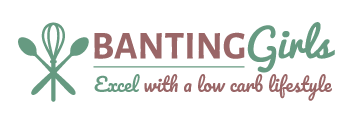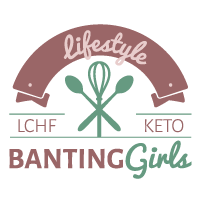A guideline is eating about 50g carbs a day, however for a ketogenic lifestyle the recommended carbs is 25g a day.
Absolutely not, it’s all about the food that you eat. This impacts your appetite control and fat storage. Eating a low carbohydrate/ketogenic lifestyle helps you use fat as a fuel source and not glucose. If you consume too little calories you be become hungry and reach for high carbohydrate foods
Yes, it is important to track what you eat especially when you are starting out on your low carb lifestyle so that you can establish a good eating pattern with the correct macro nutrients. This will also help you to make changes if you do reach a weight plateau.
ACV – Apple cider vinegar
BPC – Bullet proof coffee
EVOO – Extra virgin olive oil
MCT – medium chain triglyceride
BP – blood pressure
It is quite normal and it affects people differently. Initially when you switch from eating high carbs to low carbs your body has to adjust to burning fat as your fuel source now and not sugar. Make sure that you drink a lot of water and up your salt intake a bit, and we do recommend that you use Himalayan salt and drink a cup of bone broth a day.
Yes it is one of the best things that you can eat. Add things like sauerkraut, kimchi, kefir, kombucha to your meal planner as they are packed with good probiotics that balance your gut flora. You can also drink bone broth everyday as well as a tbsp. of raw unfiltered apple cider vinegar. See our blog on fermented vegetables on our website
Yes you can make sure that the ingredients are on the green or orange lists and that the carb count is not too high per slice.
Make sure you are getting enough magnesium in your food, e.g. spinach and avocado. You might want to invest in a good magnesium supplement as well.
Eggs, full-fat diary, cheese, yoghurt, fish, chicken with the skin on. Try to eat organic and pasture-raised animals as grains do destroy the meat’s quality, however if this is not possible, buy the best that you can afford. Lamb is good and has a natural fattiness which is good for you. Boerewors and sausages are good to but try to get ones that do not have any wheat or cereal in it. When you eat bacon try to get unsmoked bacon or bacon that is nitrogen free
It is always best to make things from scratch, however if you do want to purchase something make sure that you read the ingredient list first to make sure that there isn’t any hidden ingredients in. Sometimes a product is labelled as low carb or natural ingredients but contains items that we do not advocate on a low carb lifestyle. Make sure that you do not eat anything from the red list.
Yes it is possible to eat too much protein, you should be getting between 15 and 20% of protein per day from the food that you eat. Remember when you eat too much protein your body will convert the excess into glucose and this can spike your insulin. Keep protein portions palm sized.
Yes it is easy to eat too much fat a day therefore we recommend that you make use of a meal tracker and record what you eat. This way you will know exactly what your macros are, you should be getting between 70 and 75% of fat a day from the food that you eat.
Yes you will still lose weight, to be in ketosis your carb count for the day has to be under 25g, so it just depends on how many carbs you consume per day.
No you do not have to do any exercises although it is always recommended to stay active and walking is an excellent way of staying active
Absolutely as low carb is beneficial not just to lose weight but also to maintain a healthy lifestyle. Eat between 50 and 100g carbs per day and from the green and orange list.
You can drink normal tea, rooibos tea or even green tea. It is best to drink decaffeinated tea and coffee.
Eat as much from the meal that you feel you can and then get straight back onto eating low carb the following day.
Yes you will be able to do that, all you need to do is to introduce fat slowly but your body will become fat adapted.
It is best not to eat any fruit in the first couple of weeks until your body has adapted to the low carb lifestyle. Then it is best to eat berry fruits as they are the lowest in carbs. A 100g of strawberries will give you 5.68g carbs; 100g raspberries will give you 5.44g carbs; 100g blueberries will give you 12.09g carbs and 100g blackberries will give you 4.31g carbs.
You can drink as much of either sparkling or still water. Some restaurants though do not charge for soda water which is fine to drink as well.
Some people tend to lose quite a bit in the initial weeks as it can be mostly water. There are also a lot of things that can hamper weight loss. Make the tape measure your best friend and let that encourage you as you will surely lose centimetres even if the scale is not shifting.
No it is not necessary to have 3 meals per day. Once you get used to eating low carb healthy fats you will not eat as much and it is best to eat when you are hungry even if it is only once a day, eat until you are full when you eat. As long as you have your 70% fat; 20% protein and 10% carbs you will be fine.
You can easily adapt recipes that you make every day to be low carb and this would be satisfying for your family members as well. Involve your family to choose new recipes and soon you will be able to drop the carbs for the whole family.
If you have to have a sweet treat have a block of dark chocolate. A small block of (10g) of 90% dark chocolate has 1.4g of carbs, 80% dark chocolate has 2.3g carbs.
If you have to have any please keep to moderation and within your daily macro allowance as this is still key. We do recommend that you try to ween yourself from sweet treats.
That is entirely your decision, however alcohol is a toxin. It can also slow weight loss. It is best to lose weight first and then introduce some alcohol in small amounts if you have to have some. A 200ml of champagne has 0.03g of carbs, 150ml of red wine has 3.84g carbs, and 150ml of white wine has 3.82g carbs. If you have one 330ml of beer your intake is 12.22g carbs.
With low carb it is best to try to ween yourself totally of sugars but if you have to use anything then we would advise to use either of the following, Xylitol, Stevia or Erythritol.
The choice is up to you, however do take into consideration that a 50ml portion of full fat milk gives you 2.45g carbs, 1.64g fat and 1.64g protein where as a 30ml portion of cream give you 0.85g carbs, 9.44g fat and 0.62g protein so cream is much more beneficial and satisfying.
Yes it is quite beneficial to your body. The rule is 16:8 which means that you eat between 8 hours e.g. between the hours of 10.00 am and 18.00 pm and then you don’t eat again until 10.00 am the following day. This gives your body 16 hours of fasting. By reducing the frequency that you secrete insulin, intermittent fasting reduces the probability that you will develop type 2 diabetes.
Eat small portions of nuts, biltong, cheese, coconut chips or full cream yogurt.
Coconut oil is very healthy and you can have 2 tbsps a day.
You can use butter, ghee, lard, cream, coconut oil, avocado, nuts, and olive oil. Do not use any oils made from seeds such as sunflower seed or canola/rapeseed oil.
Just replace it with any other protein that you like eating.
Macadamia nuts, almonds, walnuts and pecan nuts are all good to eat. Remember that peanuts and cashews are legumes not nuts so should not be eaten on low carb.
You can always replace that with extra butter on your vegetables, or eat some nuts, especially macadamia nuts are very healthy and a 28g portion has 21.2g of healthy fats.
You can eat fat in relatively unlimited amounts, but only moderate protein. A healthy high protein diet for humans does not exist as too much protein gets converted to glucose as well and your body will treat it the same way as if you are eating high carb foods. Healthy fat reduces your appetite and you won’t want to eat so much which is good for you and it is the best way to get over a sugar addiction.
You can have full fat yogurt with seeds, porridge made with chia seeds, or eggs in any form with either bacon, sausage, mushrooms, spinach or avocado.
All bread, potatoes, rice, pasta, pizza, sugar, all grains, cereals, processed food either packaged or boxed, cakes, sweets, biscuits, fizzy drinks. Anything that is sweet or starchy has to go and no low fat foods. Have a look at the red list for a full list of what should be avoided.
You don’t need to buy anything special. Buy foods that you know like meat, fish, vegetables that grow above ground, butter, olive oil and cheese. Buy things that you can afford, there are cheaper options available like ghee, lard, tallow or chicken/goose fat.
Read more about healthy fats here: Fats and Oils – The Best and Worst
No, it should not be expensive, you can keep it simple by eating real food that you recognise.

